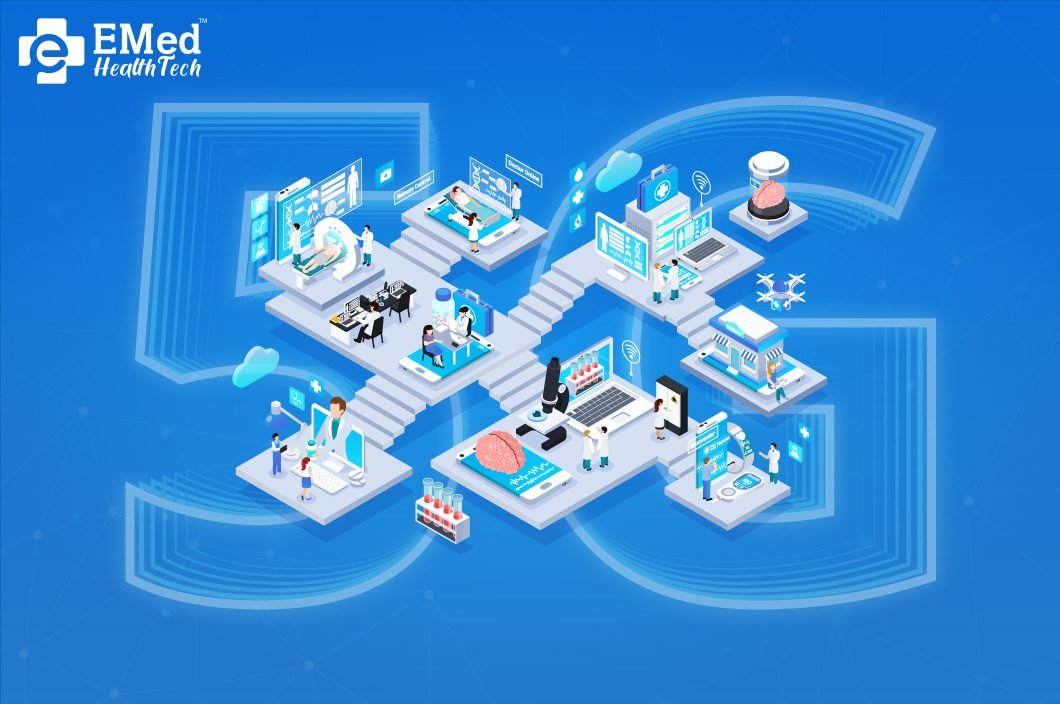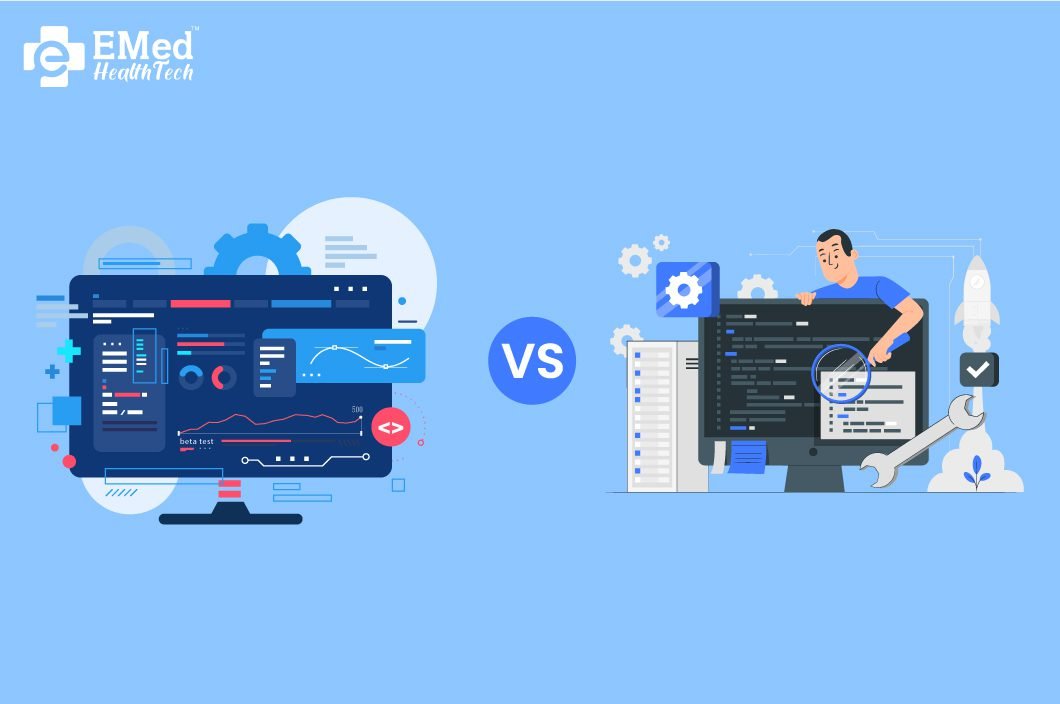The healthcare industry is rapidly changing and evolving, and technology is driving much of the progress. From AI-powered diagnostics to robotic surgery, the future of healthcare is shaped by tech solutions. Healthcare software development is essential to provide the tools needed to make this a reality, and companies are racing to develop innovative and effective solutions.
Healthcare software like telemedicine apps, EHR software, and hospital management software is increasingly popular in hospitals, thanks to their immense benefits. This is also evident in the numbers, as a study reports 80% of healthcare providers to plan to invest in digital and software solutions in the next five years.
Let us dive into the article and find out how technology is changing the future of the healthcare industry and medical software development.
Healthcare Software Development: Industry Growth
Healthcare software development is gaining momentum in the current digital landscape. According to marketsandmarkets.com, the global healthcare IT market was estimated to be at $394.6 billion in 2022. It is expected to grow to $974.5 billion by 2027. This includes IT solutions like telehealth, e-prescription, mHealth, and other HCIT solutions.
Telemedicine software is one of the hottest trends in the healthcare software development market, as it is expected to have the highest growth rate during the forecast period. Telemedicine has enabled faster decision-making and improved the quality of patient care.
The drastic surge in the use of telemedicine apps during the COVID pandemic has now stabilized to give more hopeful data showing consistent growth over time. This technology is also being widely accepted across different counties. China leads the way with a 76% adoption rate by 2024. India follows closely behind, with 59% of users already using it. Here is what you can expect from Telehealth and Telemedicine in 2023 and beyond.
The State of Custom Healthcare Software Development
The healthcare industry is no stranger to technological advancements, and custom software solutions are becoming popular for healthcare organizations of all sizes. Custom healthcare software solutions offer unique advantages to providers, allowing them to tailor their software to specific needs and optimize their operations.
According to Grand View Research, the custom software development industry was valued at $24.46 billion in 2021 and is projected to grow at a CAGR of 22.3% from 2022 to 2030.
The market growth is driven by a few important factors, such as the need for real-time data analysis in industrial applications, the requirement for more flexible workspaces to maximize productivity, and the increasing popularity of the low code development platform (LCDP) for straightforward software development. In addition, the adoption of analytics and the rise of various technologies like AI-driven Chatbots and robotics automation is fueling the market growth. Moreover, the COVID-19 pandemic triggered the adoption of technology that allowed remote working and cost-cutting for enterprises, which led to a surge in custom software for scalability.
Custom Healthcare IT Solutions Classification
Custom healthcare IT solutions can be broadly classified into two types: business-centric and patient-centric. Let us take a look at both.
Business-centric Healthcare IT solutions
Business-centric IT solutions are designed to improve the efficiency and effectiveness of healthcare organizations. Some of the popular solutions in this category include:
– Hospital Management Software: This software helps manage all the operations of a hospital, from patient management to billing and inventory control
– Electronic Health Record (EHR) Software: This software provides a secure, centralized repository for patient health information, enabling providers to access patient data anywhere at any time.
– Medical Imaging Software: Medical imaging technicians and doctors can store, manage, and analyze medical images such as X-rays, CT scans, and MRIs.
– Medical Diagnosis Software: This software helps healthcare providers make accurate diagnoses by incorporating a vast database of medical knowledge, guidelines, and algorithms.
– Medical Billing Software: The medical billing process becomes more efficient and free of error thanks to this software.
– Revenue Cycle Management (RCM) Software: This software helps healthcare organizations improve their financial performance by streamlining billing and collections processes.
Patient-centric HealthTech Solutions
Patient-centric solutions are designed to empower patients and improve their overall healthcare experience. Some of the popular solutions in this category include:
– Telemedicine Software: This software enables patients to receive medical care remotely, using video conferencing and other technologies.
– Patient Information Portal: This online platform provides patients with secure access to their health information, including test results, medication lists, and other relevant data.
– Personal Health Record (PHR) Software: This software gives patients control over their health information by allowing them to store, track, and manage their medical data.
– E-Prescribing Software: This enables healthcare providers to send prescription information directly to a patient’s pharmacy, reducing errors and increasing efficiency.
By improving the patient experience, patient-centric solutions help healthcare organizations achieve their goals of providing high-quality care and improving patient outcomes.
Leading Trends in Tech and Healthcare Software Development
The healthcare industry is rapidly evolving, driven by technological advancements and the increasing demand for better, more accessible care.
– Telemedicine and Remote Healthcare Services: With the rise of telemedicine and other remote healthcare services, patients can receive care from their homes, reducing the need for in-person visits and increasing access to care.
– Personal Medical Devices: A growing number of personal medical devices, such as wearable monitors, blood glucose meters, and heart rate monitors, are making it easier for patients to track and manage their health.
– Healthcare Software Development Based on AI: Artificial intelligence is transforming the healthcare industry by improving diagnoses, reducing medical errors, and increasing efficiency.
– Virtual and Augmented Reality Technologies: Virtual and augmented reality technologies are being used to train medical professionals, improve patient education, and even treat certain medical conditions.
– Nanotech and Robotics: Nanotechnology and robotics are being used to develop new medical devices, treatments, and diagnostic tools, making it possible to tackle some of the most challenging health problems.
– Wearable Devices: Wearable devices, such as smartwatches and fitness trackers, are becoming increasingly popular among patients, making it easier for them to monitor their health and manage their wellness.
These trends are shaping the future of healthcare, improving access to care and delivering better health outcomes for patients.
Reasons to Invest in HealthTech for Your Organization

Investing in health tech can bring numerous benefits to your organization:
– Improved Patient Outcomes: By leveraging technology and software, healthcare organizations can improve care delivery and drive better patient health outcomes.
– Increased Efficiency: Healthtech solutions can automate administrative tasks, streamline processes, and reduce errors, helping organizations to operate more efficiently.
– Better Financial Performance: By improving care delivery and reducing costs, health tech solutions can drive positive financial results for your organization.
– Increased Access to Care: With the rise of telemedicine and other remote healthcare services, patients can receive care from the comfort of their homes, increasing access to care and reducing the burden on healthcare organizations.
– Better Data Management: Healthtech solutions can provide a centralized repository for patient health information, enabling healthcare organizations to manage, analyze, and share data more effectively.
– Competitive Advantage: Investing in health tech can help your organization stay ahead of the curve and differentiate itself from its competitors.
How Custom Software Development is Shaping the Healthcare Sector

Custom software development significantly impacts the healthcare sector by providing healthcare organizations with tailored solutions that meet their specific needs and goals. Here is how:
– Improving Clinical Operations: Custom software can help healthcare organizations streamline and automate their clinical operations, improving care delivery and reducing the risk of errors.
– Enhancing Patient Experience: Custom software can be used to develop patient-facing solutions, such as telemedicine platforms and personal health record systems, that improve the patient experience and increase engagement.
– Increasing Data Management Capabilities: Custom software can provide healthcare organizations with the tools they need to manage, analyze, and share patient health data, improving decision-making and outcomes.
– Enhancing Cybersecurity: Custom software development can help healthcare organizations to implement robust cybersecurity measures, protecting sensitive patient data and ensuring regulatory compliance.
The Growing Demand for Healthcare Software Developers
The demand for healthcare software developers is rising as the healthcare industry increasingly relies on technology and software solutions. The growing adoption of health tech, such as telemedicine and electronic health records, the changing patient needs and expectations, increasing regulation, and the need to improve clinical operations are driving the demand for healthcare software developers.
Healthcare organizations seek developers who can help them develop innovative solutions that meet these needs, comply with regulatory requirements, and improve care delivery through technology and software solutions. The demand for healthcare software developers will continue to grow in the coming years.
Here you can find all details about custom healthcare app development, including types, features, advantages, and more.
How EMed HealthTech Can Help You Build Custom Healthcare Solutions
It is evident from the direction of the market and the glaring numbers that custom healthcare solution is the answer the healthcare sector needs. EMed HealthTech recognizes this.
Whether you are looking to develop a ready-made or custom healthcare software solution, EMed HealthTech can help you build the right solution for your organization. With its team of experienced healthcare software developers and a proven track record of delivering successful projects, EMed HealthTech is the ideal healthcare software development company for your next project. You can hire health-tech developers from here.















